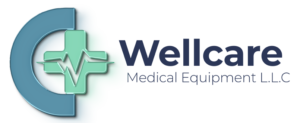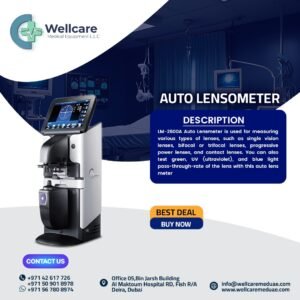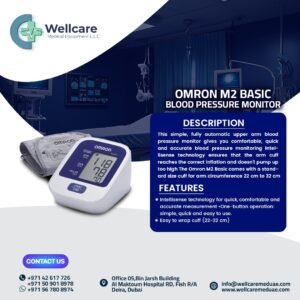Home Healthcare Equipment Supplier in United Arab Emirates
Well Care Medical Equipment LLC, based in the United Arab Emirates, is a prominent supplier of home healthcare equipment, catering to the growing demand for accessible medical devices and equipment suitable for home use. The need for high-quality home healthcare equipment is significant in the UAE, where an increasing number of individuals seek medical solutions that allow for in-home treatment and recovery. Well Care Medical Equipment LLC addresses this need by providing a range of products, from mobility aids to respiratory devices, patient monitoring systems, and more. As a supplier, Well Care Medical Equipment ensures that all its products meet stringent quality standards and comply with local regulations. This dedication to quality is critical, especially for devices used directly in patient care, as it affects patient safety, effectiveness, and comfort. The company serves a diverse clientele, including individual patients, home healthcare providers, and outpatient facilities, all looking to deliver or receive care in a non-hospital setting. The company also emphasizes customer support and after-sales services, assisting patients and caregivers in choosing the right equipment for specific health needs and providing guidance on proper usage. This approach enhances patient outcomes, as many individuals require specialized instruction for equipment like oxygen concentrators or home dialysis systems. By ensuring customers receive the support they need, Well Care Medical Equipment LLC contributes significantly to the overall quality of healthcare at home in the UAE.
Home healthcare equipment is increasingly relevant today, as it plays a crucial role in allowing patients to receive necessary medical care in the comfort of their homes. This equipment helps meet the healthcare needs of diverse patient populations, including the elderly, chronically ill, post-surgery patients, and those recovering from injuries or medical conditions. Here are several key reasons for its relevance:
Enhanced Patient Comfort and Quality of Life: Home healthcare equipment provides patients with the ability to receive care in familiar surroundings, which can significantly improve their comfort and reduce stress associated with long-term hospital stays. Being in a comfortable environment often contributes positively to mental health and overall recovery.
Cost-Effectiveness: Receiving care at home is often more affordable than prolonged hospital admissions, making home healthcare equipment an economical solution. With rising healthcare costs, families and healthcare providers alike see home-based care as a practical way to manage expenses without compromising on quality.
Independence for Patients and Caregivers: Many types of home healthcare equipment, such as mobility aids and patient monitoring devices, empower patients to manage aspects of their health independently. This not only promotes self-care but also reduces the burden on family members and caregivers, as patients can often perform daily tasks on their own.
Improved Accessibility to Healthcare: For patients who live in remote areas or have limited access to healthcare facilities, home healthcare equipment bridges the gap, providing essential medical support when hospital access is difficult. Devices like remote monitoring tools allow healthcare professionals to oversee patient health from afar, expanding the reach of medical care.
Chronic Disease Management: For patients with chronic conditions such as diabetes, heart disease, or respiratory issues, home healthcare equipment like blood pressure monitors, glucose meters, and oxygen concentrators enables ongoing management of these conditions. This ongoing care helps prevent complications and reduces the need for emergency interventions.
Enhanced Post-Surgical and Rehabilitation Support: Patients recovering from surgeries or undergoing rehabilitation benefit greatly from home-based physical therapy equipment, hospital beds, and support aids. This equipment enables a smoother transition from hospital to home, promoting faster recovery through consistent, accessible care.
Reduction in Hospital Overcrowding: By enabling more people to receive care at home, home healthcare equipment alleviates the burden on healthcare facilities, which is especially crucial in situations like pandemics or healthcare shortages. This also frees up hospital resources for critical cases, optimizing the healthcare system’s overall efficiency.
Support for Aging Population: As the elderly population grows, the demand for in-home healthcare services and equipment is also rising. Home healthcare solutions help seniors maintain a higher degree of independence and comfort, delaying or even eliminating the need for nursing home admissions.
Increased Monitoring and Early Detection: Home healthcare equipment with diagnostic or monitoring capabilities, such as heart monitors or blood glucose meters, allows for regular check-ups and early detection of potential health issues. Early detection is often critical for effective intervention, making home monitoring equipment essential in preventive care.
Personalized and Adaptive Care: With advancements in technology, many home healthcare devices are designed to adapt to the individual’s specific needs, such as adjustable beds or customized braces. This flexibility provides patients with a personalized care experience tailored to their physical requirements and preferences.
The relevance of home healthcare equipment, especially as technology advances, will continue to grow. It supports a healthcare model that is not only patient-centered but also efficient, accessible, and adaptable to changing needs.
Well Care Medical Equipment LLC provides a comprehensive range of home healthcare equipment designed to meet the diverse needs of patients seeking in-home medical care.
Mobility Aids: These include wheelchairs, walkers, canes, and crutches, designed to assist individuals with limited mobility. They also provide motorized scooters and electric wheelchairs for patients requiring additional mobility support.
Respiratory Equipment: Devices like oxygen concentrators, nebulizers, CPAP (Continuous Positive Airway Pressure) machines, and ventilators are essential for individuals with respiratory conditions such as asthma, COPD, or sleep apnea.
Patient Monitoring Systems: These include blood pressure monitors, glucose meters, pulse oximeters, and thermometers, enabling patients to monitor vital signs at home. These devices are particularly important for chronic disease management and post-hospital care.
Hospital Beds and Accessories: Adjustable hospital beds, bed rails, and special mattresses are available to ensure comfort and safety for bedridden patients. These beds often come with features that make it easier to adjust position, which can help with circulation and reduce the risk of bedsores.
Bathroom Safety Equipment: Well Care provides products like shower chairs, grab bars, and raised toilet seats, which are vital for enhancing bathroom safety, particularly for elderly or disabled individuals who need assistance in these areas.
Orthopedic Supports and Braces: These include back supports, knee braces, neck collars, and other orthopedic aids designed to help patients with joint pain, injuries, or post-surgery recovery.
Wound Care and Personal Care Products: The company supplies dressings, bandages, and skin care products needed for wound care management, as well as items like incontinence supplies, which are essential for many patients receiving home care.
Infusion and IV Therapy Equipment: Well Care also provides IV poles, infusion pumps, and accessories needed for administering IV therapy at home, which is common for patients requiring hydration, antibiotics, or other medications.
Diagnostic Tools: These include stethoscopes, otoscopes, and other diagnostic instruments that allow healthcare providers and caregivers to assess patient health at home.
Rehabilitation and Exercise Equipment: Well Care supplies rehabilitation tools like exercise bands, therapy balls, and pedal exercisers, which are useful for physical therapy and recovery.
Specialized Home Care Kits: These are all-in-one kits that may include items for specific health needs, such as diabetic care kits, wound care kits, or home diagnostic kits, providing essential tools in a convenient package.
Through these diverse offerings, Well Care Medical Equipment LLC supports patients, caregivers, and healthcare professionals in the UAE, enabling high-quality, reliable care directly in the home.
What types of home healthcare equipment are available in the UAE?
Suppliers in the UAE offer a wide range of equipment, including wheelchairs, hospital beds, oxygen concentrators, patient monitors, mobility aids, blood pressure monitors, and diabetic care devices.




